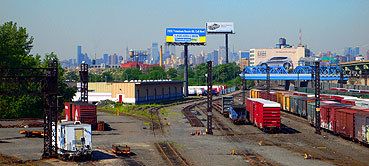Programs

Credit: Dimitris Vlachopoulos
Educational Program
The IGERT core curriculum consists of two-three integrated courses, an integrated studio, workshops, a seminar series and an annual research symposium. Additionally a list of elective courses is available. Trainees and advisors will work together to select the elective courses that will best fit each trainee’s research interests.
All IGERT Trainees take integrated courses and studio during the first two years of their IGERT experience. In the remaining years, Trainees attend the weekly seminar series and the annual research symposium. During Year 4 of the IGERT experience, each Trainee is encouraged to participate in either teaching or outreach training.
Fall 2012 Integrative IGERT Courses
CIEE E4260 - To be taken during 1st Year of IGERT funding
Urban Ecology Studio (4 Credits)
Monday 1-4pm
Wednesdays 2-4pm
Mudd 644
Trainees also engage in a Studio/ Workshop that enables them to undertake an integrative design project with their fellow trainees in a collaborative learning environment. The goal of the studios is to provide Trainees with integrative research applications to compliment the tools and approaches that are introduced in the shared coursework. Each Studio tackles an urbanization challenge that is provided by an urban stakeholder who acts as a client for the Studio. Through the studio experience and integrative courses, IGERT Trainees begin to form, and consolidate, interdisciplinary PhD dissertation topics that are both novel and relevant to urban stakeholders.
PLA6011- To be taken during the 2nd Year of IGERT funding
City as Assemblage (3 Credits)
Monday 11am-1pm
Avery 408
The purpose of this course is to explore how human and non-human realities are intertwined in the making, re-making, and un-making of cities. The focus is on the materiality of buildings, infrastructures (e.g., sewers, streets), structures such as billboards, "natural" forms (e.g., wetlands, rivers), people, and plant and animal life. The course has a perspective derived from actor-network theory and other writings on urban assemblages, "vibrant matter," cyborg urbanism, infrastructure and development, and ecology and the city. The goal is to provide the student with an historical and holistic understanding of the evolution of cities that gives precedence to networks or assemblages of human and non-human things. Explicitly rejected is that intervention involves active humans – acting alone -- engaging the passive materiality of the city.
Spring 2013 Integrative IGERT Courses
PLAN A6382
Sustainable Urban Infrastructure Systems (3 credits)
This course takes the perspective cities and their supporting infrastructures are complex system due to their interconnected and interdependent natures. Constructive dialogue is necessarily based on environmental, physical and societal considerations. Consequently, the objective of this course is to provide an inter-disciplinary framework integrating architecture, engineering and planning perspectives to focus on adaptive, ecological and resilient urban planning and design. Discussion will focus on (i) the intersections between eco-system functions and urban environments, (ii) short-term and long-term natural and man-made threats to urban areas, and (iii) policy, governance and cultural factors that can shape urbanization.
Strategic Management in Global Design & Construction
This course is designed to acquaint students with strategic issues relating to managing projects in the increasingly global design and construction industry. Many design and construction firms are adapting their business models to take advantage of virtual working environments that enable the synchronous and iterative work of a global team. Projects are dynamic and uncertain in nature requiring considerable coordination and communication to execute, particularly when project teams are globally distributed and tasks interdependent. In this course we will examine issues and strategies associated with the management of projects in global design and construction with a particular emphasis on how virtualization of the workforce is influencing and being influenced by industry globalization. Students will participate in a semester global project collaboration team project involving collaborating students from several different countries. The project assignment will be to use organizational simulation tools, 3-D CAD and 4-D CAD modeling tools to model an urban construction project and report on the findings.
Electives
Advisors and trainees will meet at the start of each semester to identify other courses that will make up the Trainee’s overall program. Some of the course can be selected from the list of IGERT Electives, which are grouped into six content areas.